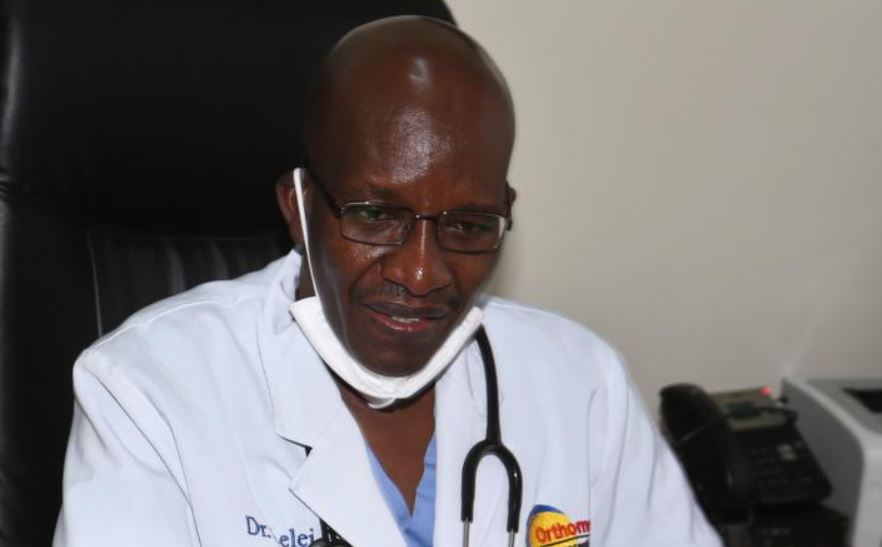
He chats about his career:
Your real name is Lectary, a Kalenjin word for doctor. Is it a nickname or did your parents know you will be a doctor?
I was born in Nakuru County to pastoralists’ parents. When colonialists abolished livestock keeping, my parents went to Tanzania. At my birth, my parents named me ‘Lectary’ (a corrupted form of doctor, in Kalenjin dialect), because three of my elder siblings had died at birth and I didn’t die. I was also named Kibor, which means the fortunate one in Kalenjin culture.
What does it take to run St Luke’s Orthopedic and Trauma Hospital in Eldoret, one of the biggest specialist private hospitals in West Kenya?
Each day, I wake up an inspired person. I yearned to become a doctor, a vision my parents had in me. I was therefore disciplined and determined to be a doctor, and that still drives me to date. This job requires passion. You will always succeed in things you are passionate about if you are dedicated.
What’s the best part about being a doctor? Is it the money? Is it being treated like a god? What is it?
I will answer this by telling you a story. I developed an interest in surgery after I was presented with a newborn at Iten District Hospital, now Iten County Referral Hospital, where I was serving as a medical officer. The baby had crohn disease (narrow intestines that prevent digestion). He was vomiting, dehydrated, abdominal discomfort, and gradually losing weight.
How did it go?
After the clinical examination, I referred the mother to Moi Teaching and Referral Hospital (MTRH), but due to long queues, she got back to Iten, and pleaded with me to conduct the operation. I was forced to read surgery notes on the operation which I successfully conducted with a team of medics at the facility. This was my first operation. The patient is now a chief accountant at St Luke’s Hospital. The woman entrusted me with the life of her baby, but to me, this was the greatest challenge I ever faced. My reward is seeing patients happy, after being healed.
You are a renowned orthopedic surgeon in the Rift Valley and western region, what haven’t you yet achieved?
I cannot say I have attained enough as a doctor. I will continue to serve the public as long as I am alive. I will be a surgeon until I am not able to do it. I believe this is my calling, as I do not have another calling. And as long as God gives me energy, I will help more people.
So St Luke is the highest pinnacle of your success?
The establishment of St Luke’s Orthopedic and Trauma Hospital, within Eldoret town is a dream come true, because when I was working as an orthopedic surgeon at MTRH, there was a rising number of patients who could not receive desired cases, because of lack of equipment and medicine. Right now, I am in a position to help such people.
What’s the biggest cause of orthopedic cases that come to your attention?
The rise in orthopedic cases is mostly from traffic accidents, more so those caused by motorcycles. But orthopedic conditions are many and affect all lives. For example at birth, children risk having developmental condition deformities, and in the middle of their lives, they are exposed to accidents and as they get older, they are prone to conditions like arthritis.
What are your most memorable surgeries?
Among successful surgeries I have done at the facility is of a woman who had suffered rheumatoid arthritis for 13 years. She had a knee replacement and was able to walk. However, I believe the facility is yet to meet its objective of serving the community, because the majority of those attending are the middle class who can afford medical bills, locking out the poor.
You took the Hippocratic Oath to serve anyone in need, so what are you doing to help those who can’t afford your fees?
Together with a team of health professionals, we have established Bone and Joint Foundation, where we conduct fund drives to offer services to children born with deformities and people in need of orthopedic services. The funds drive is done annually. Quality medical care is expensive. Having qualified staff is also expensive, reason why we raise money and provide services freely to children with deformities.
When a patient is on the table, and you are about to open them up, what goes through your mind?
I focus on the job, nothing else. Surgery is challenging as it involves cutting up somebody’s tissues and repairing bones, and that needs courage. Initially, when I started, as a medical student, it was a very traumatic and scary profession, but as I continued working, I developed the zeal and agility.
Being in operating theatres all day can be draining? So what keeps Dr Lelei going?
Medicine and surgery is what is a career followed when one has a passion, it is not a career for finances because it is a demanding profession. I have made surgery my hobby, so its reason enough to wake up early and go late to bed, serving patients. In my earlier days, I could go cycling, playing squash and walking, as an exercise, but due to a tight work schedule, I no longer have free time. However, I am a farmer when off from work.
source http://nairobiwire.com/2021/08/in-conversation-with-renowned-orthopedic-surgeon-dr-lectary-lelei-kibor.html
No comments:
Post a Comment